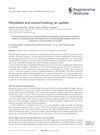11 citations,
July 2012 in “Experimental dermatology” Innate immunity genes in hair follicle stem cells might have new roles beyond traditional immune functions.
9 citations,
November 2020 in “The FASEB journal” Intermediate filaments are crucial for cell differentiation and stem cell function.
[object Object]  4 citations,
January 2023 in “Frontiers in Medicine”
4 citations,
January 2023 in “Frontiers in Medicine” Zinc is important for skin health, and supplements can help treat various skin and hair disorders, but more research is needed for conditions like psoriasis and vitiligo.
46 citations,
June 2015 in “American Journal Of Pathology” Diabetes causes lasting cell dysfunctions, leading to serious complications even after blood sugar is controlled.
 2 citations,
June 2022 in “Cosmoderma”
2 citations,
June 2022 in “Cosmoderma” Regenerative medicine shows promise for improving hair and skin but needs more research for standard use.
176 citations,
June 2019 in “Cells” Different fibroblasts play key roles in skin healing and scarring.
22 citations,
December 2013 in “Stem cells and development” Horse skin stem cells combined with platelet-rich plasma improve skin healing.
 August 2024 in “Indian Journal of Skin Allergy”
August 2024 in “Indian Journal of Skin Allergy” Stem-cell therapy shows promise for skin conditions but needs more research.
 26 citations,
October 2021 in “Clinical, Cosmetic and Investigational Dermatology”
26 citations,
October 2021 in “Clinical, Cosmetic and Investigational Dermatology” The secretome from mesenchymal stem cells shows promise for treating skin conditions and improving skin and hair health, but more research is needed.
 25 citations,
April 2021 in “The EMBO Journal”
25 citations,
April 2021 in “The EMBO Journal” Hair follicle stem cells help maintain skin health and could improve skin replacement therapies.
33 citations,
January 2018 in “Blood” Ruxolitinib helps protect skin stem cells and keeps skin healthy in mice with skin GVHD.
[object Object]  33 citations,
September 2012 in “Wound Repair and Regeneration”
33 citations,
September 2012 in “Wound Repair and Regeneration” Applying calreticulin can speed up wound healing in diabetics.
 10 citations,
July 2011 in “Wound Repair and Regeneration”
10 citations,
July 2011 in “Wound Repair and Regeneration” New antiscarring strategies show promise, including drugs, stem cells, and improved surgical techniques.
 108 citations,
September 2002 in “The Journal of clinical investigation/The journal of clinical investigation”
108 citations,
September 2002 in “The Journal of clinical investigation/The journal of clinical investigation” Lowering testosterone speeds up wound healing in male mice.
 276 citations,
December 2017 in “Journal of Dermatological Science”
276 citations,
December 2017 in “Journal of Dermatological Science” The document concludes that mouse models are helpful but have limitations for skin wound healing research, and suggests using larger animals and genetically modified mice for better human application.

Elastin-like recombinamers show promise for better wound healing and skin regeneration.
 29 citations,
November 2014 in “Experimental Dermatology”
29 citations,
November 2014 in “Experimental Dermatology” Injecting alpha-melanocyte-stimulating hormone in mice improved skin healing and reduced scarring.
 17 citations,
December 2019 in “Stem Cells International”
17 citations,
December 2019 in “Stem Cells International” Bioactive molecules show promise for improving skin repair and regeneration by overcoming current challenges with further research.
 10 citations,
January 2016 in “Elsevier eBooks”
10 citations,
January 2016 in “Elsevier eBooks” Nanoparticles can speed up wound healing and deliver drugs effectively but may have potential toxicity risks.
 5 citations,
March 2019 in “Experimental dermatology”
5 citations,
March 2019 in “Experimental dermatology” Activating TLR3 may help produce retinoic acid, important for tissue regeneration.

Dermal stem cells help regenerate hair follicles and heal skin wounds.
 146 citations,
July 2018 in “Regenerative Medicine”
146 citations,
July 2018 in “Regenerative Medicine” Understanding different types of skin cells, especially fibroblasts, can lead to better treatments for wound healing and less scarring.
 145 citations,
November 2018 in “Nature Communications”
145 citations,
November 2018 in “Nature Communications” The Sonic hedgehog pathway is crucial for new hair growth during mouse skin healing.
 141 citations,
August 2017 in “Developmental Dynamics”
141 citations,
August 2017 in “Developmental Dynamics” The document concludes that a better understanding of cell changes during wound healing could improve treatments for chronic wounds and other conditions.
 55 citations,
April 2018 in “Advanced Healthcare Materials”
55 citations,
April 2018 in “Advanced Healthcare Materials” Hydrogels could lead to better treatments for wound healing without scars.
 52 citations,
April 2013 in “Developmental Cell”
52 citations,
April 2013 in “Developmental Cell” Brg1 is crucial for hair growth and skin repair by maintaining stem cells and promoting regeneration.
 45 citations,
April 2013 in “Cell Transplantation”
45 citations,
April 2013 in “Cell Transplantation” Activin B improves wound healing and hair growth by helping stem cells move using certain cell signals.
 36 citations,
April 2013 in “Cell and Tissue Research”
36 citations,
April 2013 in “Cell and Tissue Research” Bone-marrow and epidermal stem cells help heal wounds differently, with bone-marrow cells aiding in blood vessel formation and epidermal cells in hair growth.
 29 citations,
June 2018 in “Scientific Reports”
29 citations,
June 2018 in “Scientific Reports” 15-lipoxygenase helps keep skin healthy by reducing inflammation.
 21 citations,
July 2020 in “Stem Cell Research & Therapy”
21 citations,
July 2020 in “Stem Cell Research & Therapy” Fat stem cells from diabetic mice can still help heal wounds.























